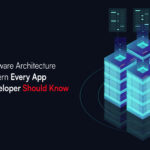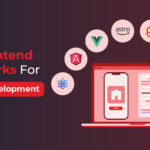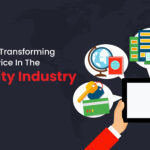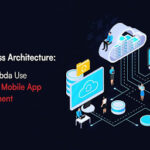Picking the right application software for your business? it might sound simple until you realize there are about a million options all promising to be the one. Some are great, others not so much. You don’t want to waste your time on something slow, buggy, or just plain useless. So, in this guide, we’re cutting through the noise and breaking down to what really matters to help you find the software that actually works for you.
Why Choosing The Right Software Application Matters?
Picking the ideal application software is not just a matter of convenience. It is a crucial element that will decide the fate of how well business strategies play out as well as the workflow momentum. The right application software won’t just support your operations but make sure that specific tasks are handled with utmost efficiency. There is also the fact that the software application you choose aligns with pre-existing infrastructure promoting maximum flexibility.
On the contrary, an incompetent application software can set you back not only financially but also damage your brand reputation, frustrate your users and waste valuable time. You might need to make modifications to your entire infrastructure just to accommodate a poorly chosen application software which can potentially expose you to harmful threats by an inept security system.
What To Look For In A Software Application
When choosing an application software, it is important that we establish the must-have and nice-to-have features to make sure to avoid any unnecessary purchases and keep an eye on the budget.
It might seem like a good idea to bloat up a software with tons of features and functionalities to cover all the bases but that is not usually the case as it would drive up the cost through the roof and might exceed your budget.
Also do keep in mind that a jack of all trades is a master of none meaning if your application software covers a broader functionality base it would be overly complicated and harder to maintain not to mention reduced specialization and efficiency in independent functions.
On the other hand an application software that has highly specialized functionality for specific tasks is far more efficient and gives more control over to the users. They are often easier to scale and require low maintenance not to mention a reduced price tag. With specialized application software you can stand out in a specific niche market as well.
Must-Have Features Checklist
If you’re confused about what to prioritize in your application software, here’s a basic list of must-have features in your application in order to improve functionality and efficiency
- Friendly UX/UI
- Security
- Scalability
- Cross-platform compatibility
- Integration
- Reliability
- RBAC
- Analytics and Reporting
- Data backup and recovery
- Offline capabilities
Option Evaluations
Now that we know what to look for in an application software that would fit your needs, let’s take a look at our options. It is important to know what the market has to offer as you might come across pre-built or off-the-shelf application software that fulfills your demands or has one custom-built to perform highly specific and niche tasks.
There is also the option to have your application software on-premise or on the cloud.
Customized Application Software
Having an application software custom-built for you is like Cinderella’s shoe which perfectly fits your entire infrastructure and is programmed to be highly efficient in the exact tasks that you require.
Custom application software can provide a great advantage to your business as it offers a unique solution to your problem that can give you a one-up against your competitors. A custom application software would also be able to adjust to existing infrastructure and will not require further modification for compatibility.
If you are looking to get a custom application software designed specifically to accommodate your needs one must seek to hire professional custom application development service providers with a reputable name.
Off-The-Shelf Application Software
Off-the-shelf application software provides a reliable and quick fix to your problem. They are designed to accommodate a wide audience and are generally the cheaper option than custom-built software as they only require a one-time license fee or a subscription which can drastically reduce expenses that would be required for maintenance of a custom application software.
These shelf applications do not require long development times as they are pre built and are ready to use with minimal configuration and are very reliable as they are usually produced by reputable vendors.
The problem with off-the-shelf application software is that they might not provide the efficiency and competence that a custom application software would provide that is specifically designed to that exact task.
On-Premise Application Software
On-site or on-premise application software refers to the traditional method of how application software is stored in physical servers hosted by the owned company which allows direct and quick access to the IT infrastructure as well as the data storage.
This is generally considered the most safest and flexible option as you have total control of the management, security and maintenance of the software as well as the hardware it runs on. On-premise also allows complete customization to accommodate your needs and requirements. For businesses and governmental industries that value data privacy above anything else and have strict regulations regarding data sharing on-premise application software provides maximum security compliance as you are not obligated to share sensitive data to cloud services.
However the downside of on-premise software is that they are really expensive and require a lot of investment and time to launch it. There are other variables to consider as well such as maintenance labor and a dedicated IT staff and limited scalability.
Cloud Computation
Software as a service or SaaS is a type of cloud computing service where one can access an application software remotely from anywhere in the world through the internet making on-site infrastructure obsolete.
Since they are hosted on remote servers rather than local ones you do not need to worry about maintenance and can get automatic updates. Many SaaS offer monthly or yearly subscriptions where you can have full access to the software application. Using cloud-based software applications can hugely cut down costs and allow immediate launch so it is a better option for new start-up companies and businesses to get going quickly and save some bucks by not opting for the on-site infrastructure. They are easily accessible throughout the world meaning one can easily work from home improving workflow and promoting collaborative projects.
One unique feature is the ease of scalability for maximum optimization. Disaster recovery or backup keeps your data safe in case of malware or security breach. Cloud computing may seem like the best option but there are some downsides as well such as limited customization and an issue of security compliance
Automation Support and AI integration
AI or artificial intelligence is good at two things, namely problem-solving and pattern recognition. So why not use its strengths to its advantage and integrate artificial intelligence into your software? In 2024 AI is in its nascent stage and can perform simple and repetitive tasks effortlessly with ease. Software applications with AI integrations can do all the grunt work while developers and programmers can concentrate on more technical complications.
However this is not a deal breaker as this technology is still developing and does not offer too much of an advantage rather it might slow you down if the AI is buggy or if it does not deliver promised results with consistency. It would add to your arsenal but it is not a necessity, at least not yet.
Exit Strategy And Future Proofing
It’s always a good thing to plan ahead and keep an umbrella with you in case of a rainy day. You can apply that analogy when you’re supposed to choose an application software that will help you perform and manage your tasks. Having an exit strategy is crucial for a growing business as the application software you have may not be able to keep up with the competition or costly to maintain or even incompatible with your goals in the future as technology evolves to avoid any potential pitfalls or “rainy days”.
Make sure your data is portable and can be easily extracted to make your switch easier. Choose an application software that allows smooth transitions to other software applications and avoid those that tie you to a single vendor. Look for flexible contracts to easily downscale and avoid hefty penalties.
The application software you choose for future use should get regular updates to keep up with the trends and should be built on widely used frameworks so they remain relevant for longer periods to avoid frequent software changes.
Conclusion
Alright, so there you have it choosing the right application software for your business isn’t just about what’s trending or which product has the flashiest features. It’s about thinking long-term. You want something that not only fits your needs today but also scales with your growth tomorrow. Find the balance between powerful features, ease of use, and adaptability. Keep an eye on flexibility and future-proofing because at the end of the day, the best software is one that works for you and not the other way around.
FAQS
How do you choose the right software for a particular task or job?
Before you purchase an application software be sure to research the product and view all their ratings and reviews. Be sure the vendor is a trustworthy source and finally test the software through demos and if available, access the free trial version first.
How to decide which software to use?
While looking for a software application you might come across multiple software that seem equally enticing and promising which can make your decision difficult. There are multiple deciding factors that you can consider on making your choice such as price and functionality. However if the options you considered offer demos or free trials, that can help in getting the feel and functionality of the software can make your decision easier.
What are the criteria for selecting a software?
A good application software comprises of the following characteristics.
User-friendly interface
- Scalability
- Reliability
- Performance efficiency
- Compatibility
- Security
- Customizability
- Regular updates and support
- Data portability
- Integration capabilities
- Cost-effectiveness
- Accessibility
- Flexibility
- Robust documentation
- Minimal downtime












They were willing to walk me through their ideas and provide suggestions when I wasn't sure about something.
Marcus Gitau Founder, Kumea, Agriculture Industry